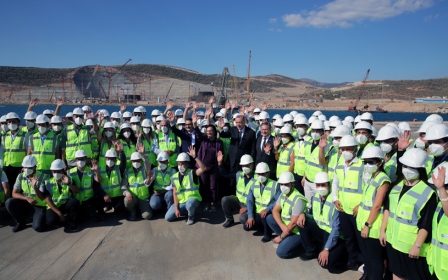Turkey's rare earth find attracts interest and scorn from rival China

When Turkish President Recep Tayyip Erdogan announced the discovery of the world’s second-largest rare earth elements reserve in Turkey’s Eskisehir last month, a slew of experts and reports questioned the quality and reliability of the 694-million tonne deposit.
Now the man who is handling the mining operations has told Middle East Eye that he is 100 percent sure the Eskisehir reserve will provide a strategic advantage to Turkey, as it has the potential to become a player in the rare earth element arena dominated by China, which controls more than 90 percent of the market.
“You can understand whether a mining reserve is worthy by looking at the interest it receives,” said Serkan Keleser, the general manager of Eti Maden, the state company that is tasked with extracting the rare earth minerals in Eskisehir.
“We have several proposals from large companies based in China, Japan and the US to work with us on this mine.”
Geologists have known for decades that Turkey has some rare earth mineral deposits in Eskisehir, but the amount was estimated to be small.
New MEE newsletter: Jerusalem Dispatch
Sign up to get the latest insights and analysis on Israel-Palestine, alongside Turkey Unpacked and other MEE newsletters
'You can understand whether a mining reserve is worthy by looking at the interest it receives'
- Serkan Keleser, general manager of Eti Maden
However, Turkish geologists refused to ignore the possibility there may be more.
Turkish Energy Minister Fatih Donmez said surveys restarted in 2011, and more than 59,000 samples have been collected and more than 125,000 metres of drilling completed. “Thus, we are sure that this is what we say it is,” Keleser said.
Donmez said last month that the Eskisehir reserve has 10 out of 17 rare earth elements, which are used in a vast array of high-tech products, including cameras, telescopes, x-ray machines and missile guidance systems.
The announcement raised eyebrows in Europe as well as China.
Beijing’s state newspaper Global Times has published two articles trying to play down the Turkish reserve, saying that China is the “only country” in the world with a “complete industrial chain” for producing rare earth elements, “a processing advantage that will not be simply diminished by the uncovering of any amount of rare-earth reserves”.
Despite the initial negative coverage, the Global Times quoted a Chinese energy expert in a second article, who said Turkey may seek to work with China to facilitate the exploration.
"China could be the best potential partner. Turkey could sign a memorandum of understanding with China, and the latter could provide one-stop technical service from exploration to sales and purchase," said Wu Chenhui, an independent rare-earth industry analyst.
Keleser believes the Chinese reports indicate that the reserve is a genuine breakthrough for Turkey. “We have offers from the Chinese state companies on our desk,” he said. “Why would we have that if it is something they could ignore?”
Fighter jets and electric cars
The Turkish energy ministry says it eventually aims to produce an annual 10,000 tonnes of rare element oxides in addition to 72,000 tonnes of barite, 70,000 tonnes of fluorite, and 250 tonnes of thorium, which is crucial for nuclear technology.
Critics say 10,000 tonnes of rare element production wouldn’t change much in a market that sees 280,000 tonnes of annual global production.
Keleser disagrees. “It will give us a competitive advantage, a strategic advantage, since the rare earth elements are used in fifth-generation fighter jets to electric cars,” he says. “We will first establish a pilot facility until the end of 2022, and then move to industrial production level. We have our own production targets, but it could grow more.”
Ilgin Kursun Unver, a professor of mining engineering at Istanbul University, agrees, noting that more rare elements could be discovered in the reserve during the industrial production phase. “That has happened at the boron reserves in Turkey," she said.
The initial plans include the construction of a pilot facility to annually process 1,200 tonnes of minerals.
These will include rare earth minerals, such as eight tonnes of lanthanum oxide, 13 tonnes of cerium oxide, three tonnes of neodymium oxide, one tonne of praseodymium oxide and half a tonne of mixed rare earth concentrate - as well as 365 tonnes of fluorite and 300 tonnes of barite, which are non-rare earth minerals but valuable nonetheless.
Both Keleser and Unver said that among this reserve, neodymium is of particular importance. “Neodymium comes to the forefront because of its value as a commodity within the automotive and energy industries, as well as its great potential to be used in various technological sectors for its association with magnets,” Unver added.
Barite is used in oil and gas exploration and the healthcare industry, while fluorite is used in steel manufacturing. Other rare earth minerals are used to make optical glasses, solar cells and goggles, and provide corrosion protection.
Keleser says Turkey first needs to learn how to process the rare earth minerals through its pilot facility, and that this may take a few years.
“However, if we decide to get help by signing a deal with an experienced foreign company to transfer know-how, the time could be significantly shortened,” he said. “That’s also a choice,” he continued, adding that Turkey may need to spend up to $2bn-$3bn to establish an industrial-level production facility.
Unver says Turkey already has certain capabilities, but the challenge would be the enriching and separation of elements in oxide and ore forms for use in industrial sectors.
One concern is the possible environmental repercussions, since these elements have the risk of poisoning the earth during their processing. Keleser says Eti Maden has already obtained an environmental impact assessment report for the pilot facility, dismissing any concerns.
When it comes to questions surrounding the size of the reserves, one Turkish energy consultant said the same worries circulated when Turkey announced the discovery of natural gas in the Black Sea in 2020.
“Yet that gas would be pumped into Turkish houses in the first quarter of 2023,” the energy consultant said. “People underestimate the energy ministry.”
Middle East Eye delivers independent and unrivalled coverage and analysis of the Middle East, North Africa and beyond. To learn more about republishing this content and the associated fees, please fill out this form. More about MEE can be found here.





